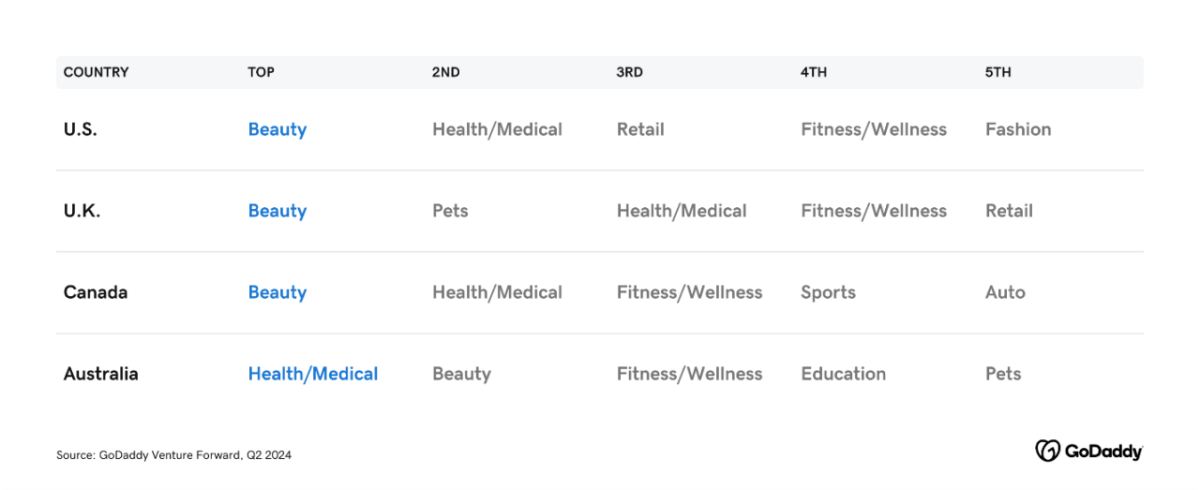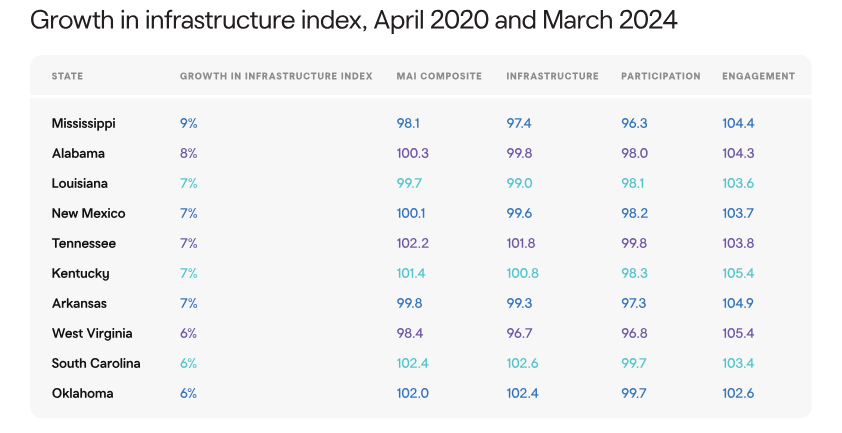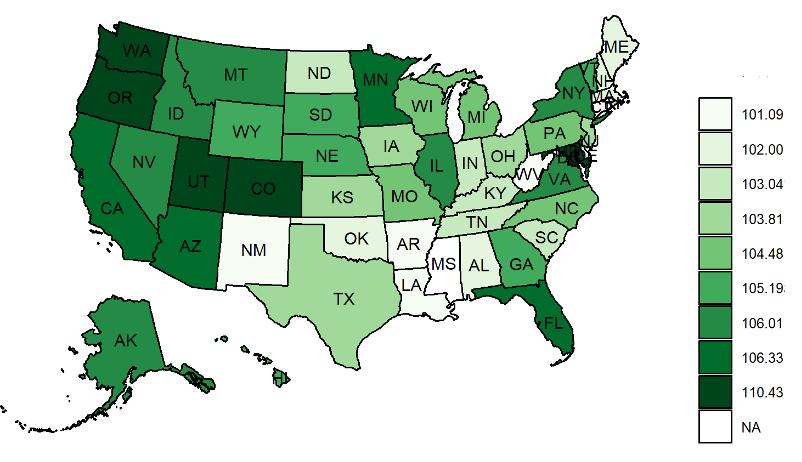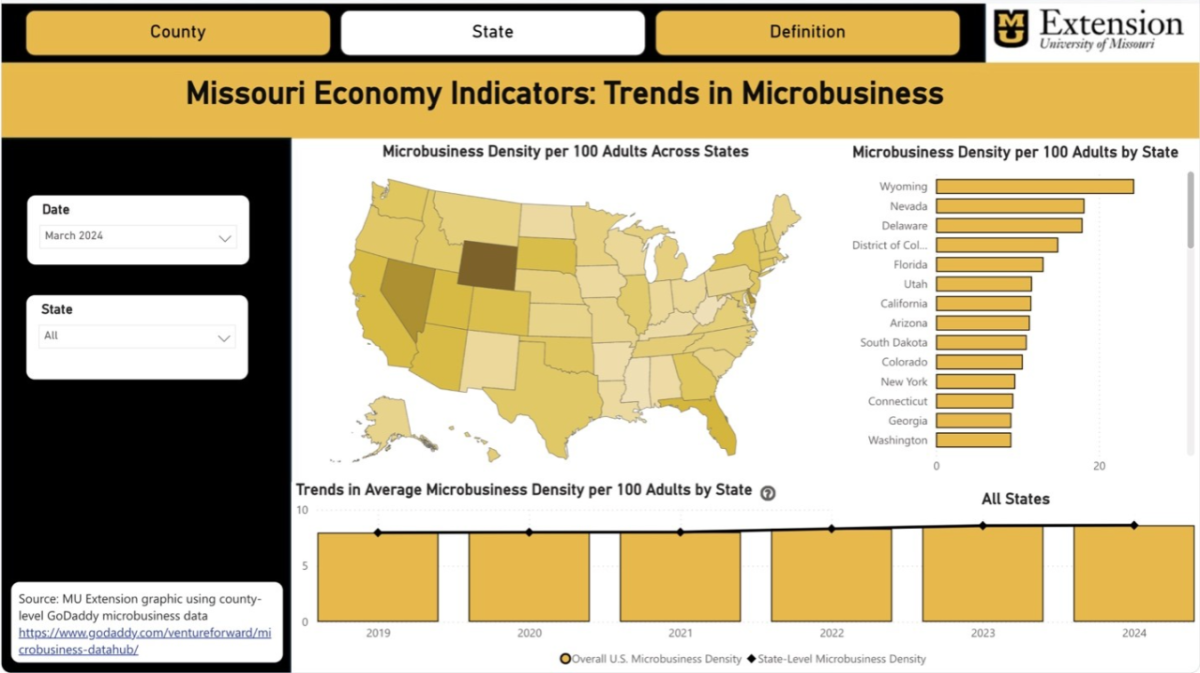GoDaddy Venture Forward Quarterly Newsletter Q3, 2024
Originally published on GoDaddy LinkedIn
Welcome to the latest issue of the GoDaddy Venture Forward newsletter! Here we share our latest exclusive data, insights and news about small and microbusinesses.
Venture Forward is a GoDaddy research initiative started in 2018 to quantify the growth and impact of online microbusinesses on their local economies, and to provide a unique view into the attitudes, demographics and needs of these entrepreneurs. To date, Venture Forward has surveyed more than 50,000 entrepreneurs with a digital presence, making it the source for microbusiness data and insights. GoDaddy defines microbusinesses as small businesses with a unique domain, an active website and most often fewer than 10 employees.
If you haven’t already, subscribe to this newsletter to get updates in your LinkedIn feed each quarter!
Alexandra Rosen
Global Head, Venture Forward
Updated Microbusiness Data Hub
We refreshed the Venture Forward Microbusiness Data Hub through June 2024, or Q2, across Australia, Canada, U.K. and U.S., including updated microbusiness density data, U.S. Microbusiness Activity Index and global e-commerce trends.
Here are two sets of rankings – the first by sector of the economy and the second by microbusiness density across geographies – for the U.S., U.K., Canada and Australia:
- Top five e-commerce industries (based on order count) in each country:
| COUNTRY | TOP | 2ND | 3RD | 4TH | 5TH |
| U.S. | Beauty | Health/Medical | Retail | Fitness/Wellness | Fashion |
| U.K. | Beauty | Pets | Health/Medical | Fitness/Wellness | Retail |
| Canada | Beauty | Health/Medical | Fitness/Wellness | Sports | Auto |
| Australia | Health/Medical | Beauty | Fitness/Wellness | Education | Pets |
| Source: GoDaddy Venture Forward, Q2 2024 | |||||
- Top five areas ranked by microbusiness density (the number of microbusinesses per 100 people) in each country:
| COUNTRY | TOP | 2ND | 3RD | 4TH | 5TH |
| Australia (SA3) | Adelade City | Sydney Inner City | Melbourne City | North Sydney - Mosman | Eastern Suburbs - North |
| Microbusiness Density |
6 |
6 |
5 |
5 |
4 |
| Canada (Province) | British Columbia | Ontario | Alberta | Quebec | Yukon |
| Microbusiness Density |
3 |
2 |
2 |
2 |
1 |
| U.K (Constituency) | Cities of London and Westminster | Stoke-on-Trent South | St Albans | Holborn and St Pancras | Hackney South and Shoreditch |
| Microbusiness Density |
23 |
14 |
9 |
9 |
8 |
| U.S. (Lg. Metros: pop. 400K+) | New York, NY |
Tulsa, OK |
Las Vegas, NV |
Ft. Lauderdale, FL |
Miami, FL |
| Microbusiness Density |
29 |
27 |
20 |
20 |
19 |
| Source: GoDaddy Venture Forward, Q2 2024 | |||||
GoDaddy/UCLA Anderson Forecast: Microbusiness Activity Index (MAI) 2024 annual report
Job creation due to digital infrastructure investment skyrocketed since the start of the pandemic. Recent data from GoDaddy and UCLA Anderson Forecast shows that digital infrastructure improvement created more than 280,000 jobs nationwide - equivalent to the entire population of Reno, Nevada - between April 2020 and March 2024.
- Growth in infrastructure index, April 2020 and March 2024
| STATE | GROWTH IN INFRASTRUCTURE INDEX | MAI COMPOSITE | INFRASTRUCTURE | PARTICIPATION | ENGAGEMENT |
| Mississippi | 9% | 98.1 | 97.4 | 96.3 | 104.4 |
| Alabama | 8% | 100.3 | 99.8 | 98.0 | 104.3 |
| Louisiana | 7% | 99.7 | 99.0 | 98.1 | 103.6 |
| New Mexico | 7% | 100.1 | 99.6 | 98.2 | 103.7 |
| Tennessee | 7% | 102.2 | 101.8 | 99.8 | 103.8 |
| Kentucky | 7% | 101.4 | 100.8 | 98.3 | 105.4 |
| Arkansas | 7% | 99.8 | 99.3 | 97.3 | 104.9 |
| West Virginia | 6% | 98.4 | 96.7 | 96.8 | 105.4 |
| South Carolina | 6% | 102.4 | 102.6 | 99.7 | 103.4 |
| Oklahoma | 6% | 102.0 | 102.4 | 99.7 | 102.6 |
Other excerpted highlights of our 2024 report
- “Recent months saw a rise in the MAI, driven by increased microbusiness engagement and Generative AI tool adoption, enabling entrepreneurs with limited resources to boost productivity and compete effectively with larger companies.
- On average, each additional entrepreneur generates over 7.4 jobs locally. Microbusiness participation also contributes to greater labor force participation.
“For context, in July 2021, the UCLA Anderson Forecast, in partnership with GoDaddy, launched a new MAI that analyzes the formation, growth, and dynamics of online microbusinesses, using data provided by GoDaddy. The MAI demonstrates a strong correlation with key economic indicators, including employment, unemployment, GDP, and offers timely insights into local economic activity. The report, featuring commentary, analysis, and the latest indices, continues to be published annually.”
Regional Impact
Q&A: Getting to know the University of Missouri Small Business Development Center team that leverages Venture Forward data for statewide economic development planning
The University of Missouri’s extension program has created an interactive dashboard to visualize GoDaddy Venture Forward’s geographical data, empowering staff at the university’s Small Business Development Center to counsel microbusinesses and educate local residents. The dashboard tracks microbusiness density (aka microbusinesses per 100 people) and the MAI, which tracks dozens of factors that impact the success of online microbusinesses. The dashboard is a powerful tool to provide economic briefs for small business counselors and data training for working professionals, among other uses.
Entrepreneurship doesn’t require a four-year degree
A four-year degree isn’t required for successful entrepreneurship. GoDaddy Venture Forward data shows that U.S. microbusiness owners with a college degree and those without contribute similar amounts of income to their household.
A significant portion of microbusiness owners without a college degree make a six-figure income, regardless of gender. Over one-third (34%) of women without a college degree and almost half of men (47%) without one make over $100k pre-tax from their microbusiness.
- Women without college degrees have more long-term dreams. They are more likely to have started their business because they always dreamed of doing so (26%), compared to women with college degrees (20%). Women without college degrees are also 6% more likely to have started because they wanted to be their own boss.
- Women with college degrees are more community-oriented. They are more likely to have started their business to contribute to their community (24%), compared to women without a college degree (19%).
In the news
U.S.
Internet expansion helps small businesses expand, too, study shows – Tech Brew
“As internet access grows, so do job opportunities, according to new data from web hosting company GoDaddy.
“The domain registrar’s research arm, Venture Forward, teamed up with economists at the UCLA Anderson Forecast to analyze state and local economic activity alongside web-hosting data, ultimately returning a composite score for the robustness of online business in a given area, Alexandra Rosen, global head of Venture Forward, told Tech Brew.
“The most recent results revealed that ‘digital infrastructure improvement created nearly 300,000 jobs nationwide between April 2020 and March 2024,’ GoDaddy said.”
U.K.
Degree of uncertainty: Are young entrepreneurs skipping higher education? – City A.M.
“Young entrepreneurs are skipping the traditional path of higher education in favour of starting their own businesses, new research has shown.
“Of the half a million digital microbusinesses surveyed by GoDaddy’s research initiative Venture Forward, 22 per cent of entrepreneurs under the age of 30 said they had started their business after their A-levels instead of pursuing a university degree. This is double the national average of 11 per cent.
“A majority of those — 76 per cent — who traded in the prospect of lecture halls for real-world experience also said they are ‘glad’ to not have the ‘burden’ of debt sitting on their shoulders.”
Australia
Why this patch of south-east Queensland is a micro-business hotspot – Sydney Morning Herald
“Tamborine, population 7500, is one of a few major towns in the Gold Coast hinterland – an area with the second-highest density of micro-businesses in Australia, research found.
“GoDaddy’s Venture Forward study this year defined micro-businesses as those with fewer than 10 employees, including solo entrepreneurs, specifically looking at those that had a presence online.
“Where most parts of south-east Queensland have one or two of these businesses for every 100 residents, the Gold Coast hinterland – made up of the towns of Springbrook, Canungra and Beechmont, along with Tamborine – has more than 11.”







